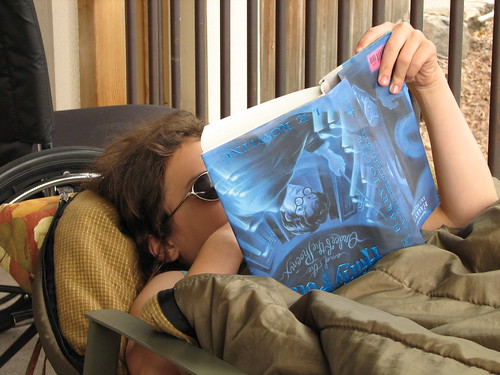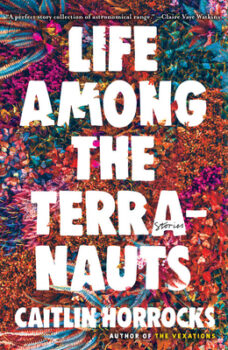I don’t know about you, but when I see a movie after reading the book on which it’s based, I almost always prefer the book to the movie. Okay, there are exceptions: The Lovely Bones, for instance, where I prefered the film, and The Princess Bride—I love both the movie and William Golding’s novel deeply, and differently.
But when it comes to Harry Potter, I land firmly on the book side. For me, much of the fun is in the details of Rowling’s world: the Fizzing Whizbees and Puking Pastilles, the elaborate recipes for Polyjuice Potion and the Draught of Living Death, the little detours into wizarding and Quidditch history. David Thier, however, disagrees, arguing in The Atlantic that the movies are superior to the books:
Rowling’s writing had that endlessly obsessive quality required of a true world builder, but her storytelling couldn’t stack up to her setting. With every book from three on, she talked about how the stories were getting “darker.” But while “darker” things happened—some characters died, terrible monsters appeared, and schoolyard quarrels evolved into wars of racial purification—the tone could never quite catch up to the circumstances. […]
There was an epic to be told, but Rowling was never able to get past the appropriately childish tone of her earlier books and commit to the gravity of the classic story she had set out to tell.
Then they made them into movies. Hollywood knows nothing better than the old stories, and the boy of destiny is a favorite: We’ve seen it everywhere from Star Wars to Rookie of the Year to The Matrix. Rowling seemed somehow resistant to telling that story directly, but the movies have shown no such trepidation. And they’ve given the tale the kind of narrative drive and attention to tone that the books lacked.
Thier’s close-reading of the tone of the books is spot-on—as he puts it, “Silliness butts up against severity throughout the latter books.” I agree that those details didn’t deserve much, if any screen time, but does that mean they don’t belong in the books? The writer in me says, “Those do not advance the narrative. Kill your darlings.” The reader in me says “But.. but.. the boggarts! The contest for the Quidditch Cup! Dumbledore’s weakness for candy!” Where do you draw the line?
Perhaps you’re a step past me on the spectrum, and you think the world of the books can—nay, should—be fleshed out even more. In that case, you may find fanfiction—and this excellent article on it by Lev Grossman—right up your (Diagon) alley:
Even back then it was apparent that fan fiction was not just an homage to the glory of the original but also a reaction to it. It was about finding the boundaries that the original couldn’t or wouldn’t break, and breaking them. Issue No. 3 of Spockanalia included a story called “Visit to a Weird Planet,” in which Kirk, Spock and Bones are transported to the set where Star Trek is being filmed and get confused with the actors who play them (Bones: “I’m a doctor, not an actor!”). Spockanalia No. 4 ran a story in which Spock has an affair with a fellow Federation officer. These were homages to Star Trek, but at the same time they were critiques: I love the show, but what if it went further? What happens if I press this big, shiny, red button that says “Do not press”? […]
Fictional worlds, while they appear solid, are riddled with blank spots and unexposed surfaces. There’s a moment toward the end of Harry Potter and the Goblet of Fire when Dumbledore suggests offhandedly that Sirius Black should “lie low at Lupin’s” for a while, referring to Harry’s former teacher Remus Lupin. What exactly did Sirius and Remus get up to there, chez Lupin, while they were lying low? How low did they lie? (Cough, slash, cough.) Rowling never says, but that one little gap has given rise to so much fan fiction that “lie low at Lupin’s” has become a recognized trope of Harry Potter fan fiction, a sub-subgenre in its own right.
It’s human nature to press at the boundaries of stories, to scrabble at the edges, to want to know what’s going on just out of range of the camera. Fan fiction teems with prequels and sequels, missing scenes restored and plot holes patched. It retells canonical stories from new points of view — the reverse-angle instant replay. How did the events of The Prisoner of Azkaban look from Neville Longbottom’s perspective? Moaning Myrtle’s? Mrs. Norris’? “To say that a story stops after we close a book is absurd,” says Maltese. “To say that we can think certain things about a story or what might happen next in a story or what might have happened if someone had turned left instead of right but that we can’t write them down is absurd.”
And, as Grossman points out, some works that might be considered fanfiction are deemed “literature” in their own right. Remember that whole controversy about The Catcher in the Rye and an aging Holden Caulfield? Or before that, the controversy about The Wind Done Gone and Gone with the Wind? Literature has its own kind of Stockholm syndrome: captivate your reader so thoroughly, and he or she will never want to leave the world you’ve created.
The cure for this literary Stockholm syndrome, perhaps? Hollywood, where movies can pare away your details and get at the core of your story.







